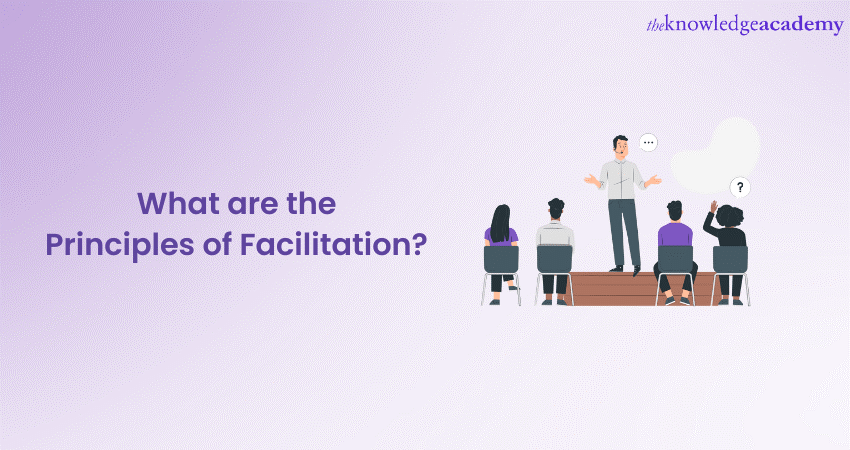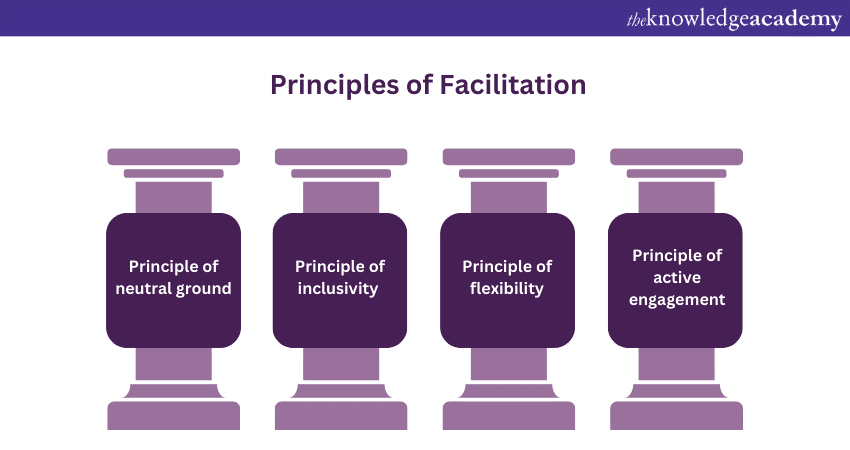We may not have the course you’re looking for. If you enquire or give us a call on 01344203999 and speak to our training experts, we may still be able to help with your training requirements.
Training Outcomes Within Your Budget!
We ensure quality, budget-alignment, and timely delivery by our expert instructors.

In any collaborative setting, like a business meeting, workshop, or team discussion, effective Facilitation is key to achieving successful outcomes. Facilitation is the art of guiding groups towards their goals by creating a supportive and productive environment. Skilled Facilitators possess unique Principles of Facilitation that underpin their approach, allowing them to foster engagement, encourage open communication, and drive meaningful results.
According to a survey by SessionLabs, almost 54.9 per cent of Facilitators are freelancers or self-employed and are often complete outsiders when facilitating sessions. Having strong basics helps them thrive in such settings.
If you, too, want to create a safe space for dialogue and effectively manage conflicts, it’s time to learn about these principles. Read this blog to explore the essential Principles of Facilitation that every aspiring Facilitator should understand and apply, equipping themselves with the necessary knowledge to navigate through facilitation skills interview questions with confidence and competence.
Table of Contents
1) Principles of Facilitation
a) Principle of neutral ground
b) Principle of inclusivity
c) Principle of flexibility
d) Principle of active engagement
2) Conclusion
Principles of Facilitation
Facilitation as a tool to resolve conflicts and improve coordination in a team has the following basic principles:

Principle of neutral ground
The principle of neutral ground is one of the fundamental Principles of Facilitation that centres on maintaining impartiality and objectivity throughout the Facilitation process. As a Facilitator, creating a safe and non-judgmental environment is crucial for encouraging open and honest dialogue among participants. By adopting a neutral stance, the Facilitator can set aside personal opinions, biases, and preconceived notions, thereby fostering an atmosphere of trust and respect among all individuals involved.
Neutral ground allows participants to feel comfortable expressing their thoughts, ideas, and problems without fear of being judged or dismissed. When people feel that their contributions are valued and respected, they are more likely to engage actively in the discussion, leading to richer insights and more meaningful outcomes. This principle is especially crucial when dealing with sensitive or controversial topics, as it helps prevent potential conflicts and ensures that all voices are heard and considered.
Remaining neutral also helps the Facilitator effectively mediate conflicts that may arise during the session. By not taking sides, the Facilitator can focus on understanding the underlying issues and facilitating a constructive resolution. This approach enhances the credibility of the Facilitator, as participants recognise their commitment to maintaining an unbiased and fair process.
However, adhering to the principle of neutral ground does not mean being detached or unresponsive. It involves active listening, empathetic understanding, and validating participants' emotions and perspectives. The Facilitator must strike a delicate balance between neutrality and engagement. They must ensure that they are approachable and supportive while still avoiding personal biases that could influence the group's dynamics.
The principle of neutral ground enables Facilitators to create a safe, inclusive, and productive space for group interactions. By embracing this principle, Facilitators can build trust among participants, encourage open dialogue, and navigate challenging situations with fairness and diplomacy. The practice of neutral Facilitation not only leads to better decision-making and problem-solving but also empowers participants to collaborate and learn from one another in a supportive and respectful environment.
Principle of inclusivity
The Principle of Inclusivity is a cornerstone of effective Facilitation, emphasising the importance of creating an environment where every individual feels included, welcomed, and respected. Inclusivity goes beyond acknowledging diversity; it involves actively seeking out and embracing different perspectives, experiences, and backgrounds to enrich the collective wisdom of the group.
A truly inclusive Facilitator understands that each participant brings their individual strengths and insights to the table. They proactively encourage diverse participation, making sure that no voice is overlooked or overshadowed. By doing so, they tap into a wealth of ideas and perspectives that might otherwise remain untapped, leading to more innovative and robust solutions.
To foster inclusivity, Facilitators must be sensitive to potential barriers that might hinder participation. These barriers could include cultural differences, language barriers, or power dynamics within the group. By being mindful of these challenges, Facilitators can implement strategies to level the playing field and ensure equitable participation.
One practical approach to promoting inclusivity is to set ground rules that emphasise respect and openness. Establishing an environment where people feel safe to express themselves without fear of judgment encourages diverse viewpoints to emerge.
Additionally, inclusive Facilitation involves being aware of different communication styles and preferences. Some participants may be more comfortable speaking openly, while others might prefer written communication or anonymous feedback. By accommodating different communication preferences, Facilitators can ensure that all voices are heard and considered.
Inclusivity is not limited to encouraging participation during the session; it also extends to decision-making processes. Facilitators should involve participants in shaping the meeting agenda, co-creating solutions, and evaluating outcomes. This collaborative approach not only reinforces inclusivity but also boosts ownership and commitment among participants.
The Principle of Inclusivity seeks to break down barriers, foster mutual respect, and build trust within the group. By embracing diversity and creating a safe and inclusive space for dialogue, Facilitators empower participants to engage meaningfully, leading to more impactful and sustainable results. Inclusivity is not merely a buzzword; it is a fundamental value that underpins the success of any Facilitation endeavour.
Elevate your impact with our Facilitation Skills Training and master the art of guiding productive and collaborative discussions.
Principle of flexibility
The Principle of flexibility is a fundamental tenet of effective Facilitation that allows Facilitators to adapt and respond to the unique dynamics and challenges of each group they work with. Flexibility empowers Facilitators to remain open-minded and adjust their approach in real time, ensuring the Facilitation process remains relevant, engaging, and productive.
Facilitators must recognise that every group they work with is different, with diverse personalities, communication styles, and objectives. Being rigid in their Facilitation Techniques can hinder the group's progress and inhibit the achievement of desired outcomes. Embracing flexibility means being prepared to pivot and modify the Facilitation plan when necessary, based on the group's needs and emerging circumstances.
In practice, the principle of flexibility requires Facilitators to continuously observe the group's dynamics, assess the level of engagement, and gauge the participants' receptiveness to the current approach. If they sense disinterest or confusion, a flexible Facilitator will readily switch gears and employ alternative methods to re-energise the group.
Moreover, flexibility involves being agile in managing unforeseen challenges and disruptions that may arise during the Facilitation process. For instance, if a discussion becomes contentious or emotionally charged, a skilled Facilitator will employ conflict resolution techniques or take a break to diffuse tensions before proceeding.
Being flexible does not mean abandoning structure altogether; instead, it means embracing a fluid and adaptable structure that responds to the participants' evolving needs. This might involve reorganising the agenda, shifting the focus of discussions, or incorporating impromptu activities to address emerging issues.
By embodying the principle of flexibility, Facilitators demonstrate their commitment to providing a supportive and responsive environment for participants. This approach not only fosters trust and respect but also encourages group members to embrace change and adapt themselves. As Facilitators model flexibility, they inspire participants to be open to new ideas, consider alternative perspectives, and collaborate more effectively.
The principle of flexibility is a crucial aspect of Facilitation that enables Facilitators to navigate the dynamic landscape of group interactions successfully. By remaining open to change, adjusting their approach to meet the needs of the group, and embracing unforeseen challenges, flexible Facilitators create an atmosphere that fosters engagement, creativity, and meaningful collaboration. Ultimately, the ability to be flexible empowers Facilitators to facilitate with confidence and make a lasting impact on the groups they lead.
Principle of active engagement
The principle of active engagement lies at the core of effective Facilitation, as it is the driving force behind productive and dynamic group interactions. When participants are actively engaged in the Facilitation process, they become more invested in the discussion, leading to increased collaboration, creativity, and problem-solving capabilities.
Facilitators play a crucial role in encouraging active engagement by employing a variety of strategies and techniques. One such approach is fostering an environment of inclusivity, where every participant feels comfortable and confident to share their thoughts and ideas. By actively listening and acknowledging each contribution, Facilitators demonstrate respect for diverse perspectives, motivating participants to actively participate in the discussion.
To stimulate engagement, Facilitators can incorporate interactive activities and group exercises into the session. These hands-on experiences encourage participants to apply their knowledge, sparking curiosity and deepening understanding. Additionally, employing visual aids, multimedia, and technology can make the Facilitation process more dynamic and captivating.
Encouraging questions and discussions is another essential aspect of promoting active engagement. Facilitators should create opportunities for participants to challenge assumptions, explore different viewpoints, and engage in critical thinking. By encouraging healthy debate, Facilitators facilitate a deeper exploration of ideas, leading to more comprehensive and informed decision-making.
Moreover, understanding and catering to different learning styles is crucial in maintaining active engagement. Some participants may prefer visual cues, while others may respond better to auditory or kinaesthetic approaches. By incorporating a mix of learning techniques, Facilitators can maximise participant engagement and knowledge retention.
The principle of active engagement transforms Facilitation from a passive information exchange to an immersive and collaborative experience. Facilitators who prioritise active engagement create an environment where participants feel valued, heard, and motivated to contribute their best efforts. Through active engagement, Facilitators empower groups to harness their collective potential, resulting in more meaningful and impactful outcomes.
Elevate your skills with our Facilities Management Training and master the art of efficient facility operations.
Conclusion
Mastering the Principles of Facilitation is a transformative skill that can elevate group dynamics and lead to more productive and satisfying interactions. By adhering to the principles of neutral ground, inclusivity, flexibility, and active engagement, Facilitators can create an environment that fosters collaboration, creativity, and effective decision-making.
Unlock your potential with our Industry Training and elevate your skills to new heights.
Frequently Asked Questions
Upcoming Business Skills Resources Batches & Dates
Date
 Facilitation Skills Training
Facilitation Skills Training
Fri 17th Jan 2025
Fri 28th Mar 2025
Fri 23rd May 2025
Fri 27th Jun 2025
Fri 8th Aug 2025
Fri 17th Oct 2025







 Top Rated Course
Top Rated Course



 If you wish to make any changes to your course, please
If you wish to make any changes to your course, please


